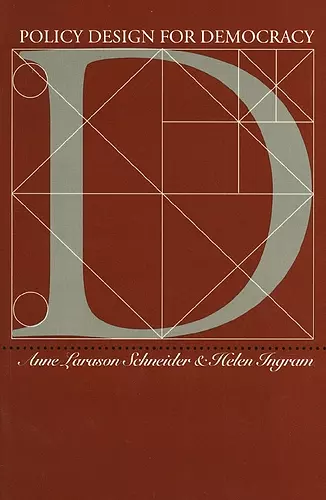Policy Design for Democracy
Helen Ingram author Anne Larason Schneider author
Format:Paperback
Publisher:University Press of Kansas
Published:30th Sep '97
Currently unavailable, our supplier has not provided us a restock date

How can democracy be improved in an age when people are profoundly disenchanted with government? Part of the answer lies in the design of public policy that unmistakenly works to advance citizenship by listening to, educating, and involving ordinary people. Rather than serve mainly the narrow interests of powerful groups who are socially constructed as "deserving" or issuing discipline and punishment to powerless people socially constructed as "undeserving," public policy needs to advance citizenship, solve problems, pursue justice, and balance the interests of individuals with a concern for the collective good.
Policy Design for Democracy is a theoretically sophisticated work that draws examples from a wide array of public policy arenas. It summarizes four current approaches to policy theory-pluralism, policy sciences, public choice, and critical theory-and shows how none offers more than a partial view of the policy design characteristics that support and perpetuate democracy. Schneider and Ingram then develop a theory of public policymaking predicated on understanding how differences in policy designs are related to differences in the contexts from which they emerge and how these designs have an impact on democracy.
One of the first books to examine systematically the substantive aspects of public policy, Policy Design for Democracy is written clearly and with sufficient examples to make it easily understandable by undergraduates. Its linkage of public policy to citizenship is an important antidote to the overly technical and goal-driven orientation adopted by the policy sciences and public choice, and to the overly self-interested and strategic political games found in pluralist theory. Schneider and Ingram close by recommending a series of reforms that will improve policy designs and help restore citizen confidence in government.
The book is cogent and well written, offering clear discussion in a logical format." —American Political Science Review
"Critical and perceptive." —Governance
!One of the many attractions of the book is that it takes seriously the claims of social science to explain policy change and stability. . . the book uses the use of the concept of policy design to fill the gaps in rather than replace empirical research. Also, for the practitioner, Schneider and Ingram recommend general principles for good design." —American Politics Review
"In this incredibly rich and sophisticated analysis, Schneider and Ingram develop a theoretical framework that both highlights how the elements of policy designs are socially constructed and explains how the characteristics of those designs often work to weaken democratic values and processes. This superb book will be of special value to those interested in policy studies." —Choice
"This is a policy textbook with point of view and attitude. It will influence the next generation of students (graduates and undergraduates alike) and it will have to be taken with utmost seriousness by scholars, practitioners, and politicians."—Theodore Lowi, author of American Government and The End of Liberalism
"Schneider and Ingram have resynthesized the policy literature around one central question: how do various elements of policy design and policy making help or hinder democracy? And in their new bottles, the old wine really does taste better."—Deborah A. Stone, author of The Disabled State and Policy Paradox and Political Reason
"This superb review, critique, and synthesis of policy theory will enable everyone concerned with public policy, whether as practitioner, teacher, or student, not only to understand the process better and be more effective, but to think clearly about the values on which policy should be built."—John Mollenkopf, author of A Phoenix in the Ashes
"It is time for intelligent optimism in political science, and Schneider and Ingram serve us well. Their formulation of ‘policy design’ wonderfully reminds us that policy has content and not mere form. They offer a framework that seeks to overcome degenerative policymaking, of which there is surely enough, and to achieve constructive results through democratic means. It is Lasswellian in spirit, but also reminds one of Norton Long."—Matthew Holden, Jr., author of Continuity and Disruption
ISBN: 9780700608447
Dimensions: 228mm x 151mm x 19mm
Weight: 360g
256 pages